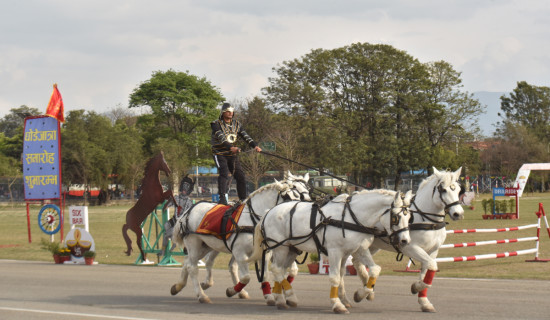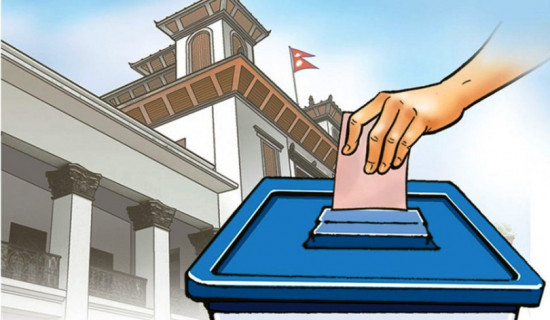- Thursday, 26 February 2026
Police bust gang selling citizenships to non-Nepalis
Police have arrested a gang of five members involved in selling of Nepali citizenships to non-Nepali citizens, especially to the Tibetans, by forging government documents, seals, and stamps.
Cavalry show ready for Ghodejatra in Tundikhel
Nepali Army’s cavalry soldiers and over 60 horses are all set to showcase a special parade in the Ghode Jatra festival in Tundikhel, Kathmandu on Tuesday. They are all groomed and spe
Proposed Nepal Police Act to end 30-year service term
The Ministry of Home Affairs (MoHA) has put forward a proposal to make a new Police Act replacing the existing Nepal Police Act-1955 with the much awaited provision to scrap the 30-year service term in the organisation.
Bill to amend T&R Act registered in parliament
The government has registered the bill to amend the Act on Commission on Investigation of Disappeared Persons, Truth and Reconciliation, 2014 in the Federal Parliament Secretariate on Thursday.
Holding centres lie empty in lack of operation modality
Almost seven months have elapsed since the completion of the construction of holding centres nearby the border points of all seven provinces that were initially meant for holding, diagnosis and treatment of people infected with COVID-19.
Police alert public about misuse of mobile banking app
The police have requested everyone to be especially careful with people who ask for cash and take citizenship and passport by showing different assurances and enticements/temptations through social media.
77% financial crimes in Valley
The frequency of financial crimes has increased rapidly over the years. According to the police statistics, in five months of the current fiscal year, financial crimes have almost reached close to the level of the last fiscal (2021/22) total. The statistics of the police show that cases related to ban
Committee formed to speed up Fast Track works
The Nepali Army has formed a coordination and monitoring committee to speed up the ongoing work of the Kathmandu-Terai Madhes Fast Track (Expressway) project, one of the national pride projects of the country.
Police adjustment process still in limbo
The much-talked police personnel integration process has been in limbo for almost three years even after the introduction of Police Personnel Integration Act-2020. Security officials and experts have blamed the federal government’s intention to dictate the police for the delay in the adjustment of the police in the provinces.
Govt mulls amending Police Act to scrap 30-year service provision for retirement
As soon as the Ministry of Finance gave a consent to amend the Nepal Police Act 1955 to scrap 30-year service provision in the Nepal Police, the Ministry of Home Affairs has begun internal homework to implement the new age-based service term in the organisation.
Cambodia emerging destination for human trafficking: Police
A young woman filed a complaint at the Anti Human Trafficking Investigation Bureau (AHTIB) of the Nepal Police in mid-June of this year. The gist of her complaint was that she was lured for a lucrative job in Cambodia, where she faced abuses.
Security forces prove their mettle in holding elections in single phase
Minus some minor glitches, it has been established that all four security agencies of the country have been capable enough and proved themselves competent in overall security arrangements and their proper execution after the local and general elections were concluded successfully in a single phase on May 13 and November 20, respectively.
Operation to regulate unlicensed drones begins
Illegal and haphazard use and flying of Remotely Piloted Aircraft (RPA) popularly known as drone without taking permission and license from the concerned district administration office has increased lately, Ministry of Home Affairs (MoHA) said.
Personnel mobilised for poll security nationwide
All the four security agencies have been mobilised for the elections of the House of Representatives and the Provincial Assemblies to be held on November 20. With just seven days left for the election, teams of Nepal Police, Nepali Army, Armed Police Force Nepal (APF) and National Investigation Department have reached the designated constituencies, according to security officials on Sunday.
Amid scores of independent candidates, election of Kathmandu-7 turns unpredictable
Based on the results of local level polls held this year in May in Kathmandu Constituency No. 7, the ruling coalition seems to be strong. But it is not so easy for Ashmita Singh (Manushi) Yami Bhattarai, who is contesting the election for the House of Representatives (HoR) from CPN (Maoist Centre) with sickle and hammer inside the circle as election symbol, representing the alliance, to win the election.















